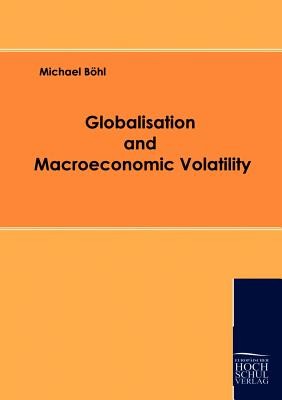
- We will send in 10–14 business days.
- Author: Michael Böhl
- Publisher: Europaischer Hochschulverlag Gmbh & Co. Kg
- Year: 2009
- Pages: 72
- ISBN-10: 3941482181
- ISBN-13: 9783941482180
- Format: 14.8 x 21 x 0.4 cm, minkšti viršeliai
- Language: English
- SAVE -10% with code: EXTRA
Reviews
Description
Does globalisation affect economic stability? And if so, how? The interest of the book is in supposed effects of globalisation on macroeconomic volatility. Globalisation in economic terms can be defined as international integration of goods and factor markets. During the last decades, goods trade and financial flows have risen strikingly. Macroeconomic volatility can refer to several aggregates such as output and its components, prices and employment. During the "Great Moderation", variability of economic growth and inflation rates has changed significantly. The first part focuses on the possible effect of international goods market integration on output volatility. Three candidate mechanisms are theoretically introduced and empirically tested. Those channels relate to external risk, offshoring and sudden stops. The second part describes other potential determinants of output volatility, such as the international integration of financial markets, monetary and fiscal policy, and shocks. Each determinant is theoretically described and empirically revised. The importance of globalisation relative to other sources in affecting output volatility is evaluated. The summarised findings of the analysis: A careful thesis about effects of globalisation on output volatility should be differentiated along several dimensions. Firstly, globalisation of goods and financial markets must be distinguished. Secondly, even for international goods trade various mechanisms affect the volatility of output differently. Thirdly, for each channel the direction and weight of the effect depend on country characteristics. In a conclusion the author offers alternative ways of interpretation for economic policy.
EXTRA 10 % discount with code: EXTRA
The promotion ends in 23d.22:41:23
The discount code is valid when purchasing from 10 €. Discounts do not stack.
- Author: Michael Böhl
- Publisher: Europaischer Hochschulverlag Gmbh & Co. Kg
- Year: 2009
- Pages: 72
- ISBN-10: 3941482181
- ISBN-13: 9783941482180
- Format: 14.8 x 21 x 0.4 cm, minkšti viršeliai
- Language: English English
Does globalisation affect economic stability? And if so, how? The interest of the book is in supposed effects of globalisation on macroeconomic volatility. Globalisation in economic terms can be defined as international integration of goods and factor markets. During the last decades, goods trade and financial flows have risen strikingly. Macroeconomic volatility can refer to several aggregates such as output and its components, prices and employment. During the "Great Moderation", variability of economic growth and inflation rates has changed significantly. The first part focuses on the possible effect of international goods market integration on output volatility. Three candidate mechanisms are theoretically introduced and empirically tested. Those channels relate to external risk, offshoring and sudden stops. The second part describes other potential determinants of output volatility, such as the international integration of financial markets, monetary and fiscal policy, and shocks. Each determinant is theoretically described and empirically revised. The importance of globalisation relative to other sources in affecting output volatility is evaluated. The summarised findings of the analysis: A careful thesis about effects of globalisation on output volatility should be differentiated along several dimensions. Firstly, globalisation of goods and financial markets must be distinguished. Secondly, even for international goods trade various mechanisms affect the volatility of output differently. Thirdly, for each channel the direction and weight of the effect depend on country characteristics. In a conclusion the author offers alternative ways of interpretation for economic policy.


Reviews